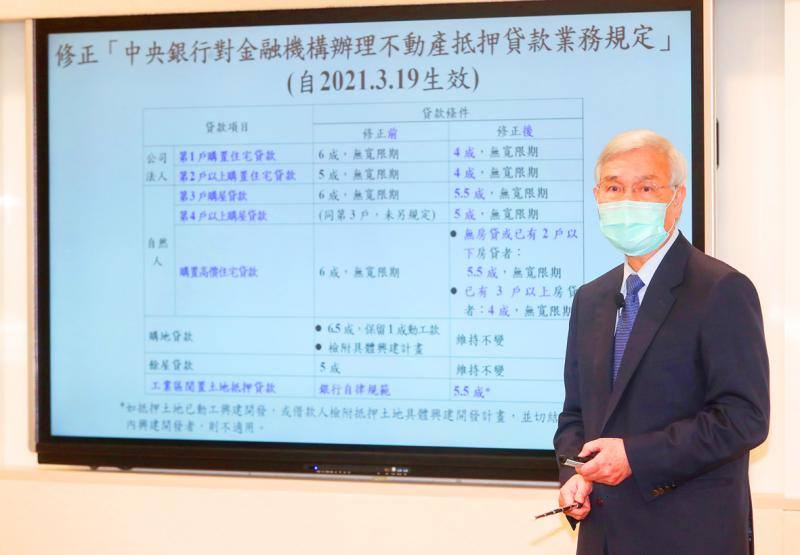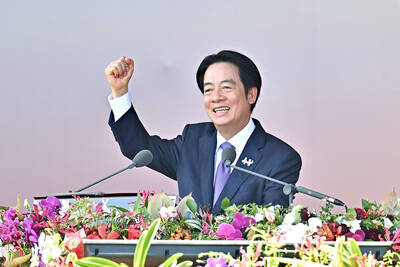The central bank yesterday further tightened credit controls for mortgage operations, cutting the loan-to-value (LTV) ratio by 10 percentage points amid a surge in home loans over the past three months, which raised overconcentration risks.
However, the bank left its policy rates unchanged, even though it substantially revised upward its forecast for Taiwan’s GDP growth this year from 3.68 percent to 4.53 percent.
“The board decided to lower the LTV limit to 40 percent for all corporate buyers and 50 percent for multiple-home owners, to rein in house hoarding and property price hikes,” central bank Governor Yang Chin-long (楊金龍) told a media briefing after a quarterly board meeting in Taipei.

Photo: CNA
Mortgage lending in January jumped 9.17 percent from a year earlier to NT$8.11 trillion (US$286.51 billion), while construction and land financing soared 18.7 percent to NT$2.5 trillion, the steepest increases since October 2006 and July 2011 respectively, central bank data showed.
The latest credit controls aim to stem property speculation by highly leveraged borrowers, but would not affect people with real demand or urban renewal projects, Yang said.
No grace period was allowed.
Concerted efforts by government agencies are intended to induce a soft landing for the local property market, he said.
The Ministry of Finance is pushing property tax revisions that would impose punitive levies of 45 percent on homes resold within five years of purchase, up from two years.
It is better to act before expectations of property price hikes take root, Yang said, singling out people and companies that own more than four properties as the main target of the strictest credit controls.
As of last year, more than 13,000 companies and 80,938 individuals met the threshold, together owning about 14 percent of homes in Taiwan, Ministry of the Interior data showed.
Most companies resell such properties one year after purchase, the data showed.
Yang said that he has no intention of raising interest rates, because such moves would affect other sectors and attract global capital when major central banks are printing money.
While the world looks on course to emerge from the COVID-19 pandemic, uncertainty abounds, he said, adding that related relief loans would not expire until June this year.
The central bank has lowered the lending cap for luxury housing from 60 percent to 55 percent, and is to enforce a 55 percent limit on loans for industrial plots of land that was previously only recommended.
Luxury housing prices tend to be more volatile in times of corrections, Yang said.
Mild inflation in Taiwan gives the central bank room to stick with its accommodative monetary policy, he said.
The central bank said that the consumer price index is expected to rise 1.07 percent and the core reading to edge up 0.77 percent.

The Ministry of the Interior (MOI) is to tighten rules for candidates running for public office, requiring them to declare that they do not hold a Chinese household registration or passport, and that they possess no other foreign citizenship. The requirement was set out in a draft amendment to the Enforcement Rules of the Public Officials Election and Recall Act (公職人員選舉罷免法 ) released by the ministry on Thursday. Under the proposal, candidates would need to make the declaration when submitting their registration forms, which would be published in the official election bulletin. The move follows the removal of several elected officials who were

FOUR DESIGNATED AREAS: Notices were issued for live-fire exercises in waters south and northwest of Penghu, northeast of Keelung and west of Kaohsiung, they said The military is planning three major annual exercises across the army, navy and air force this month, with the navy’s “Hai Chiang” (海強, “Sea Strong”) drills running from today through Thursday, the Ministry of National Defense said yesterday. The Hai Chiang exercise, which is to take place in waters surrounding Taiwan, would feature P-3C Orion maritime patrol aircraft and S-70C anti-submarine helicopters, the ministry said, adding that the drills aim to bolster the nation’s offshore defensive capabilities. China has intensified military and psychological pressure against Taiwan, repeatedly sending warplanes and vessels into areas near the nation’s air defense identification zone and across

SENATE RECOMMENDATION: The National Defense Authorization Act encourages the US secretary of defense to invite Taiwan’s navy to participate in the exercises in Hawaii The US Senate on Thursday last week passed the National Defense Authorization Act (NDAA) for Fiscal Year 2026, which strongly encourages the US secretary of defense to invite Taiwan’s naval forces to participate in the Rim of the Pacific (RIMPAC) exercise, as well as allocating military aid of US$1 billion for Taiwan. The bill, which authorizes appropriations for the military activities of the US Department of Defense, military construction and other purposes, passed with 77 votes in support and 20 against. While the NDAA authorizes about US$925 billion of defense spending, the Central News Agency yesterday reported that an aide of US

NATIONAL DAY: The ‘Taiwan Dome’ would form the centerpiece of new efforts to bolster air defense and be modeled after Israel’s ‘Iron Dome,’ sources said President William Lai (賴清德) yesterday pledged to strengthen the nation’s air defense capabilities and build a “T-Dome” system to create a safety net against growing military threats from China. “We will accelerate our building of the T-Dome, establish a rigorous air defense system in Taiwan with multi-layered defense, high-level detection and effective interception, and weave a safety net for Taiwan to protect the lives and property of citizens,” he said in his National Day address. In his keynote address marking the Republic of China’s (ROC) 114th anniversary, Lai said the lessons of World War II have taught nations worldwide “to ensure that